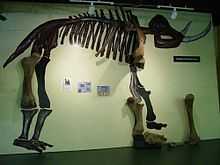Akron Fossils & Science Center

The Akron Fossils & Science Center is a museum located in Copley Township, Ohio, USA, a few miles west of Akron, devoted to presenting creation science and the notion of intelligent design.
History

It was opened May 26, 2005,[1] by William Sanderson II, a financial planner and former Cincinnati middle-school science teacher.[2] Sanderson has an MBA from Malone University in Canton, Ohio, and a BSc degree in education from Miami University in Oxford, Ohio.[3] Exhibits tend to the hands-on. Touchable displays include a woolly mammoth jawbone, fossils, dinosaur teeth, bones and eggs, a mastodon skeleton, and castings of alleged Inca burial stones (never authenticated by scientists)[1] depicting humans being killed by dinosaurs.[4][5] A block-rolling game demonstrates the supposed difficulty of randomly generating a 17 amino acid sequence to form a protein.[2][6]
Many of the center's projects are targeted at children, including "Truassic Park", a dinosaur-themed outdoor playground, a summer camp, a creationist canoe expedition, and a weekly high-school-level biology class.[2] An ongoing study of a local creek is meant to teach young scientists in the area about data collection and procedures.<ref name=""WSL 2006">"Center studying Copley creek", by Kathleen Folkerth, 2006-05-04, West Side Leader. Retrieved August 20, 2008.</ref> Center staff participated in the opening of a similar but larger center, dubbed the Creation Museum, in Kentucky, but say the hands-on nature and focus on children of the Akron Fossils & Science Center sets it apart.[7]
Criticism
The scientific community considers creationism to be pseudoscience.[8][9][10] As a result, science organizations, such as the National Center for Science Education, criticize the promotion of creationism as a form of non-science.[11][12] Glenn Branch, deputy director of the NCSE explained "[The museum's] scientific claims are simply wrong and have been debunked long ago, and students who are misled by them are likely to be at a disadvantage as they study science at institutes of higher learning."[2]
References
- ↑ 1.0 1.1 "Creation Based Science Museum Opens Today", audio report by Vincent Duffy, May 26, 2005, WKSU. Retrieved August 20, 2008.
- ↑ 2.0 2.1 2.2 2.3 "Jurassic Lark", by James Renner, June 6, 2007, Cleveland Free Times. Retrieved August 20, 2008.
- ↑ "Malone college: 2005 Alumni Awards", Malone University, 2006. Retrieved August 20, 2008.
- ↑ "Museum devoted to creationism", by Charita M. Goshay, Canton Repository, June 21, 2005. Retrieved August 20, 2008.
- ↑ "Copley home to creation-based science museum", by Stephanie Kandel, 2005-05-12, West Side Leader, archived by the Internet Archive, 2005-05-24. Retrieved August 20, 2008.
- ↑ "Museum takes a biblical path Critics say creationists put religion over science", by Frank Bentayou, The Plain Dealer, June 3, 2005. Retrieved August 20, 2008.
- ↑ "Creation Museum in Northeast Ohio", video, Belinda Prinz, MyFox Cleveland, 29 May 2007. Retrieved August 20, 2008.
- ↑ Finding the Evolution in Medicine, Cynthia Delgado, NIH Record, July 28, 2006.
- ↑ As reported by Newsweek: "By one count there are some 700 scientists (out of a total of 480,000 U.S. earth and life scientists) who give credence to creation-science, the general theory that complex life forms did not evolve but appeared 'abruptly'," in "Keeping God out of the Classroom (Washington and bureau reports)", Larry Martz & Ann McDaniel, Newsweek CIX(26): 23-24, June 29, 1987, ISSN 0028-9604
- ↑ "Creationism in any of its forms, such as 'intelligent design', is not based on facts, does not use any scientific reasoning and its contents are pathetically inadequate for science classes.""The dangers of creationism in education". Council of Europe. Archived from the original on 13 August 2007. Retrieved 2007-08-03.
- ↑ "Project Steve: FAQs". National Center for Science Education. 2008. Retrieved 2008-09-06.
- ↑ Scott, Eugenie (2008). "Statements from Scientific Organizations". National Center for Science Education. Retrieved 2008-09-06.
External links
- Akron Fossils & Science Center official site